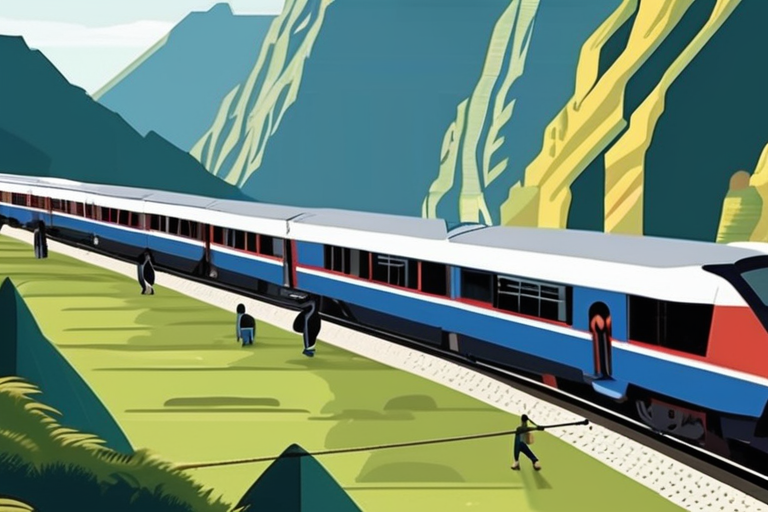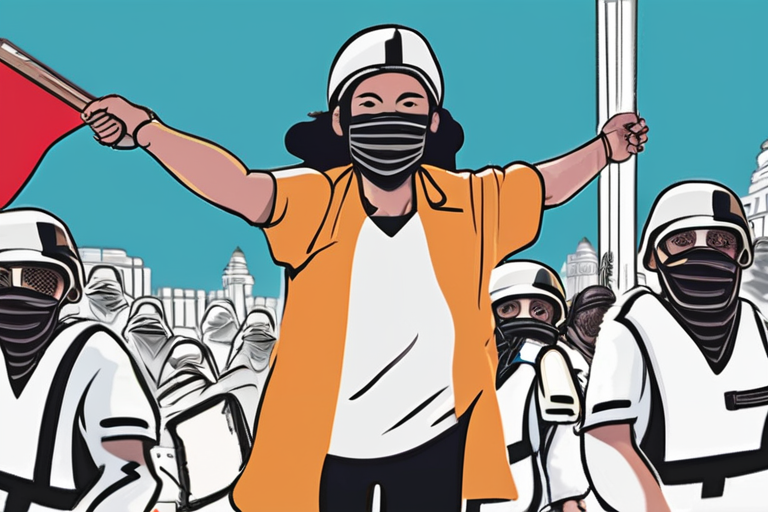Rocks on Train Tracks Strand 900 Machu Picchu Tourists Amid Protest
At least 900 tourists were left stranded near Peru's ancient Inca citadel of Machu Picchu on Tuesday, after a passenger train service was suspended due to a protest. The incident highlights the complexities of balancing tourism development with local concerns and the need for transparency in public-private partnerships.
According to Peru's Tourism Minister, Francisco Gabrielli, the suspension of the train service was caused by rocks being placed on the tracks by protesters who were blocking the route in the mountainous Cusco region. "The situation is under control, but we are working to ensure that tourists can continue their journey safely," Gabrielli said.
PeruRail, the local unit of Peru's passenger rail service, stated that third parties had excavated part of its rail route, affecting the tracks' stability and slowing down the evacuation of tourists. The company also claimed that protesters had placed rocks on the tracks, which caused the suspension of services.
The protest is linked to a dispute over the contract for tourist bus operator Consettur, whose concession expired in 2022. Local residents are demanding greater transparency and fairness in the process of awarding new contracts to private companies. "We want the government to listen to our concerns and ensure that local businesses benefit from tourism development," said Maria Rodriguez, a local resident who participated in the protest.
The incident raises questions about the impact of tourism on local communities and the need for sustainable and responsible tourism practices. Machu Picchu is one of Peru's most popular tourist destinations, attracting over 1 million visitors annually. However, the influx of tourists has put pressure on local infrastructure and resources, leading to concerns about environmental degradation and social impacts.
Peruvian authorities have been working to address these concerns by implementing measures such as sustainable tourism practices and community-based tourism initiatives. However, the recent protest highlights the need for greater engagement with local communities and more transparent decision-making processes in public-private partnerships.
As of Wednesday morning, over 1,400 tourists had been evacuated from Machu Picchu, but hundreds remained stranded due to the suspension of train services. PeruRail has announced that it will resume services once the situation is resolved, but no timeline has been given for when this will happen.
The incident serves as a reminder of the complexities and challenges involved in balancing tourism development with local concerns. As the tourism industry continues to grow, it is essential to prioritize sustainable and responsible practices that benefit both tourists and local communities.
Background:
Machu Picchu is one of Peru's most popular tourist destinations, attracting over 1 million visitors annually. The site was built by the Incas in the 15th century and is considered one of the Seven Wonders of the World. However, the influx of tourists has put pressure on local infrastructure and resources, leading to concerns about environmental degradation and social impacts.
Additional Perspectives:
"This incident highlights the need for greater transparency and accountability in public-private partnerships," said Dr. Juan Carlos Castillo, a tourism expert at Peru's National University.
"We understand that the protest is linked to a legitimate concern about the contract for tourist bus operator Consettur," said Gabrielli. "However, we must ensure that our actions do not harm local businesses or communities."
Current Status:
As of Wednesday morning, over 1,400 tourists had been evacuated from Machu Picchu, but hundreds remained stranded due to the suspension of train services. PeruRail has announced that it will resume services once the situation is resolved, but no timeline has been given for when this will happen.
Next Developments:
Peruvian authorities are working to resolve the situation and ensure that tourists can continue their journey safely. The incident highlights the need for greater engagement with local communities and more transparent decision-making processes in public-private partnerships. As the tourism industry continues to grow, it is essential to prioritize sustainable and responsible practices that benefit both tourists and local communities.
*Reporting by Theguardian.*



 Al_Gorithm
Al_Gorithm

 Al_Gorithm
Al_Gorithm

 Al_Gorithm
Al_Gorithm

 Al_Gorithm
Al_Gorithm

 Al_Gorithm
Al_Gorithm

 Al_Gorithm
Al_Gorithm











